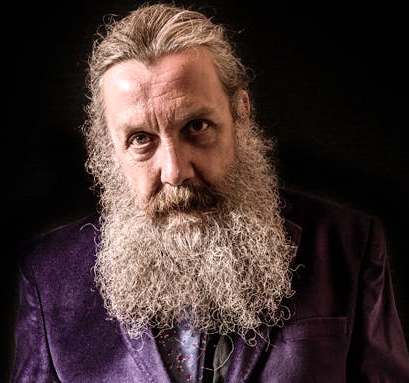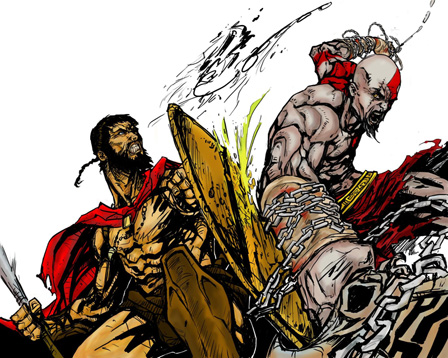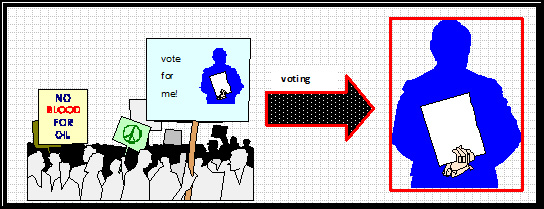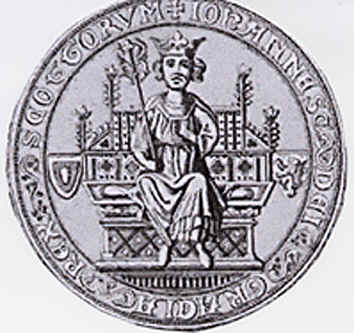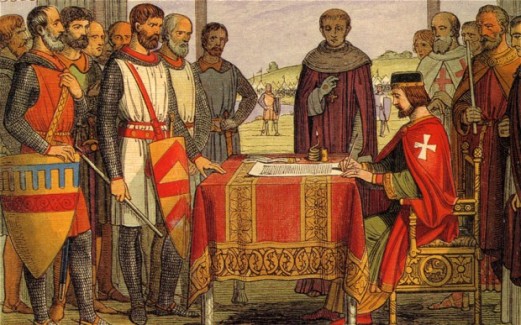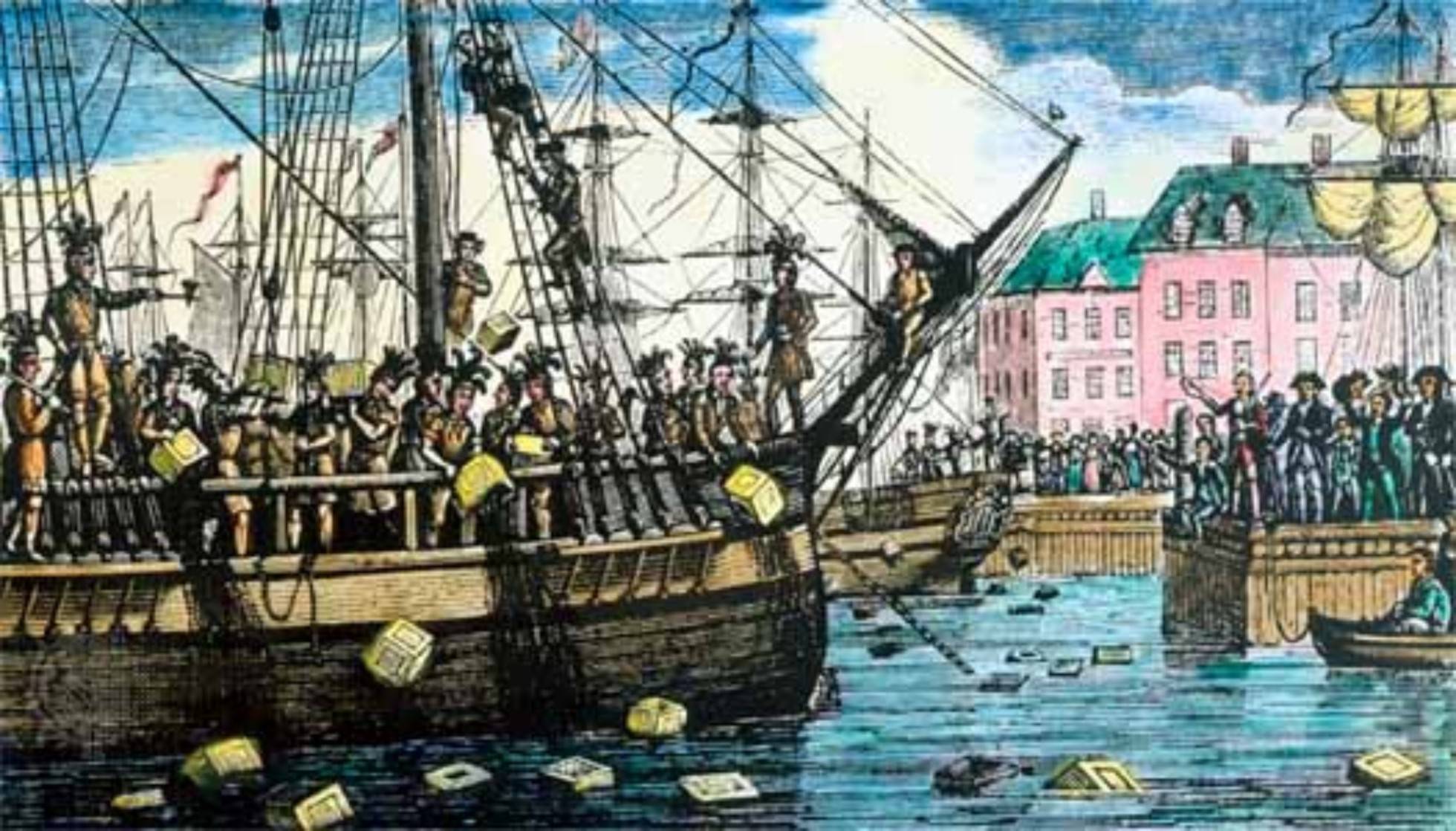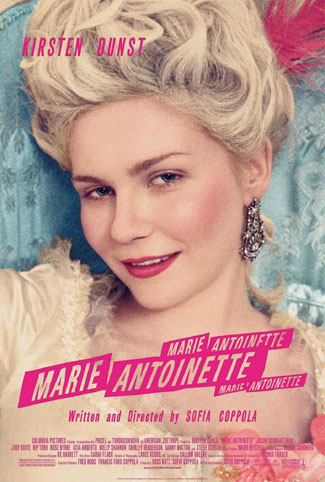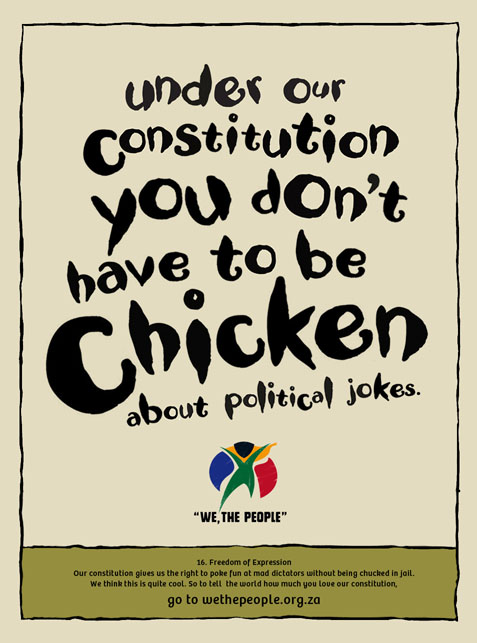|
Module Two |
||||||||||||||||||||||||||||||||||||||||||||||||||||||
|
"People shouldn't be afraid of their government.Governments should be afraid of their people."
Alan Moore, writer. born 1953 Democracy is it !Who asked for it anyway, and where does it come from?So where does it all come from?We now have some idea why democracy is so popular. But how does it work, and where does it come from? And what does it have to with the ancient Greeks?The word itself comes from two Greek words:
demos (common people)
+
kratos (power)
The Greeks seem to have it all …Ancient Greece had a collection of city states – relatively small compared to the large cities of today. The Greek philosopher, Aristotle, did research on the political activities of a number of Greek city states and also gave birth to the idea of democracy in 384-322 BC.Aristotle expected as many people as possible to participate in the decision making process by attending public meetings and voting on almost all issues (some countries, like Switzerland insist on their citizens voting on a regular basis for many public and local issues such as a new bridge, or a new school principal for instance).He also demanded that public accounts – all details of how money was spent should be posted on the city gates for all to see. What a good idea! Imagine being able to see at all times what the government is spending your money on. Do you know why it is your money?This is called a Participatory Democracy, and works reasonably well in city states, or small communities..If everyone is expected to attend every meeting and vote on every issue, what problems do you foresee?Most modern states have found that this type of democracy causes too many problems, and have adapted the ideology of pure democracy so that we have what is known as a Representative Democracy.In this system, because the common citizen is often too busy building a career and a family, he/she elects someone else to attend the meetings and vote on all the issues.In a sense the power is handed over to the Elected Representative.Are you happy with the fact that you are handing over your power? Are you happy that it means having someone else decide for you?
Can power be taken away again?Why do some people not really believe or feel they have the power?Does this system of representation really work? Say how it might or might not work by giving details.
The Magna Carta:The charter of English political and civil liberties granted by King John at Runnymede in June 1215.
King John of England found himself in serious trouble with his nobles because of heavy taxation; they felt vulnerable and forced the king to sign this document in 1215. The relationship between the king and his nobles was outlined in this text: “no scutage (type of tax) or aid shall be imposed in our kingdom, unless by the common council of our kingdom, except to redeem our person, and to make our oldest son a knight, and once to marry our eldest daughter; and for this there shall be paid a reasonable aid.”
Details about civil liberties such as the freedom of the church, laws protecting subjects and towns and also rights to a free trial (before this, subjects could be convicted on rumour!), were either clearly laid out or hinted at.This very famous document laid the foundation for the principle of no taxation without representation.And this was the very cry of the people in the American Civil War.It gets more interesting - read on ...The Boston Tea party - when will they learn?The American colonists managed their own affairs up to 1765 – all costs involved were raised by the colonists themselves. But then King George III of England decided to exercise his own authority and imposed certain taxes on them. He raised an army to exercise this authority and used the income from these taxes to pay for it. As you can imagine, the colonists, who were not represented in the British parliament, were very unhappy about this.
Many commentaries believe that this imposition of taxation without representation was one of the causes of the American Civil War.
Marie, Oh Marie …; just a little bread, please
Mary Antoinette, the queen of France and wife of the much loved, but weak king Louis XVI, is often seen as the worst kind of monarch. When told that the people were starving and did not have bread to eat, she is reported as saying, “Give them cake.” “The stories of Antoinette's (financial) excesses are vastly overstated. In fact, rather than ignoring France's growing financial crisis, she reduced the royal household staff, eliminating many unnecessary positions that were based solely on privilege. In the process she offended the nobles, adding their condemnation to the scandalous stories spread by royal hopefuls, including the Duc' D'Orleans, whose son became Louis XVIII. It was the nobility that objected to the financial reforms the government ministers tried to make, not the King and Queen, who were in favor of change.” © 1995-98 Lucid Interactive. Whatever the truth, the people of France wanted a democracy, cut off her daughter’s head and paraded it in front of her; then they cut off her head and that of her husband. The famous French Revolution forever changed the way we see government. Liberté, Égalité, Fraternité (“Liberty, Equality, Fraternity”)
What have we learnt about the three main historical events that brought about democracy?What were the people really saying?If you imagined that you were visiting or living in a perfect democracy, what would you expect to find within that ideology in modern political and everyday terms?
Try not to proceed, until you have thought about this... Why Don't You Decide....?Once a country and its people have decided how they would like their democracy to work, a constitution is usually drawn up. What do you think is important in a democracy in which people have the say, have rights, have representation?Think of the law, power, etc...Write down principles you think are important ...
Have you finished your list?If you have, scroll down to see what most countries consider really important...
True Signposts of Democracy:
Now - some work for you - draw or illustrate the relationship between you, a citizen within a democracy, and elected officials – the members of parliament, for example. Try to include the following: the word - ideology; citizens; an elected official; the word - power; the Constitution... Use these to show the relationship between them - how they fit together. How does power relate to a member of the public and an elected official, for instance? Where does the Constitution fit in? Take the time to fill an entire page using all of the elements/terms I have given you
Good luck.
When you think you've got it right. Click here. But only when you have really tried, and not before... What else besides power/authority do we give the government of the day?
GIVING MONEY AND POWER TO GOVERNMENT IS LIKE GIVING WHISKEY AND CAR KEYS TO TEENAGE BOYS. P.J. O'Rourke, US poet, journalist.
Do you think the above quotation is true, or does it merely act as a warning?How can we trust elected officials to spend the money effectively?Can you remember what they did in the Greek City states?
The one element of democracy that holds the entire process together so that the people can trust the representative, and the representative can feel that he or she is empowered to carry out the mandate and spend the money given to the government by you, is the concept of ……….
accountability
Only with this essential element of democracy in place can things begin to work. There is a difference between accountability and public accountability; what is it?Think about this; write down the difference and then debate this if you're doing this course in class.
An individual should be accountable to himself or his/her boss, family for instance.But a public official is accountable to ...?S/he should be, both, accountable to themselves, their superiors, their institutions AND to the voters, citizens and members of the public.Ushering In The Age Of Accountability: here a spokesperson for The Institute of Internal Auditors South Africa (IIA SA) speaking about Public Accountability of ministries and Elected Officials ...
List a few
democratic
Scroll down only when you've finished.
Hint: public accountability is, of course, one of them...
Democratic Principles For Public Financial Control:
WE ESTIMATE THE WISDOM OF NATIONS BY SEEING WHAT THEY DID WITH THEIR SURPLUS CAPITAL. Ralph W. Emerson. US essayist, philosopher.
If you take a good look at the Signposts of Democracy and also to the Democratic Principles for Financial Control and management, one can see that while the ideals of democracy are essential – equality, liberty, justice for all, freedom of speech, etc., much of what the government does and does not do comes down to money. Whether they provide services or not (housing, water, education, etc.) all depends on whether they have the money. After our taxes have been paid, and someone wastes the money, spends it on something that does not benefit us, the spending has not been carried out according to those principles. And this means that some community will go short: it's money out of your pockets. We should do something about it. It is not enough to expect the government to act alone. Our famous Constitution and Bill of Rights are not only an instruction to the government to provide services for us, they are signposts, instructions and guidelines for citizens to act also. Act by taking part and being aware ...
The constitution cannot work unless we make it work. You. Do it today. Find out how an efficient democracy works, and make sure those around you know too.
Someone once said that every country gets the government it deserves. Remember that a bad government is in power only because the people put it there.
A former US president, Theodore Roosevelt, affectionately known as Teddy, once said the following:
THE GOVERNMENT IS US; WE ARE THE GOVERNMENT, YOU AND I.
I believe that if every citizen of any country truly understood this, the country would run more effectively.
CongratulationsYou have completedModule Twohow did you do?In Module Three wewill be takinga look at the services ourelected officials provide us with.Are theythe services you want or expected?
Let's go there...
|
||||||||||||||||||||||||||||||||||||||||||||||||||||||
